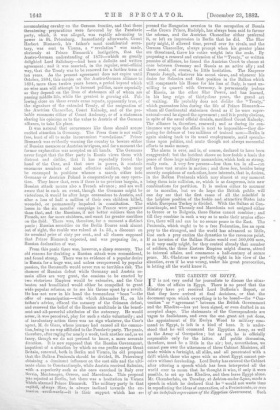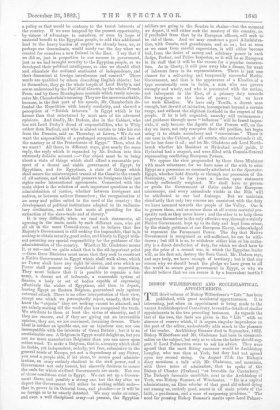THE CABINET ON EGYPT.
IT is not very useful for journalists to discuss the situa- tion of affairs in Egypt. There is no proof that the Ministry have yet received Lord Dufferin's Report, or that they have arrived at final decisions, or that the document upon which everything is to be based—the " Con- vention " or "agreement" between the British Government and the Khedive—has yet been signed, or even drafted in an accepted shape. The statements of the Correspondents are vague to foolishness, and even the one great act yet done, the appointment of Sir Evelyn Wood to military com- mand in Egypt, is left in a kind of haze. It is under- stood that he will command the Egyptian Army, as well as the Army of Occdpation ; but as yet, he is officially responsible only for the latter. All public discussion, therefore, must be a little in the air ; but, nevertheless, we cannot pass over the utterances of three Cabinet Ministers, all made within a fortnight, all alike, and all penetrated with a drift which, those who agree with us about Egypt cannot per- ceive without foreboding. Lord Derby has entered the Cabinet after uttering xt speech which has been interpreted all the world over to mean that he thought it wise, if only it were possible, to set up the Khedive, and then leave Egypt alone. Mr. Chamberlain, on Tuesday, at Ashton-under-Lyne, made a speech in which he declared that he "would not waste time in repudiating the ideas of annexation, of a Protectorate, or even of an indefinite supervision of the Egyptian ,Government. Such a policy as that would be contrary to the truest interests of the country. If we were tempted by the present opportunity, by visions of advantage to ourselves, or even by hope of material benefit to the Egyptian people, to add this additional load to the heavy burden of empire we already bear, we, or perhaps our descendants, would surely rue the day when we created for ourselves a new Ireland in the East. I say that if we did so, just in proportion to our success in government, just as we had brought security to the Egyptian people, as we developed their political intelligence, so also we should elicit and stimulate the national sentiment of independence, and their discontent at foreign interference and control." These words are qualified by others describing English objects ; but in themselves, they go the whole length of Lord Derby's, and are so understood by the Pall Mall Gazette, by the whole French Press, and by those Birmingham journals which rarely miscon- ceive Mr. Chamberlain's meaning. They are the moreremarkable, because, in the first part of his speech, Mr. Chamberlain de- fended the Expedition with hearty cordiality, and showed a perception of "British interests" in Egypt which is far keener than that entertained by most men of his advanced opinions. And finally, Mr. Dodson, also in the Cabinet, who has not Lord Derby's dread of responsibilities, who is Whig rather than Radical, and who is almost certain to take his cue from the Premier, said on Thursday, at Lewes, "We do not want the responsibility of a prolonged occupation, still less of the mastery or of the Protectorate of Egypt." Then, what do we want? All three, in different ways, give nearly the same reply, the reply which is expanded by Mr. Dodson into this extremely definite account :—" Our object must be to bring about a state of things which shall afford a reasonable pro- spect of a decent and stable government of Egypt, by Egyptians, and for Egyptians, a state of things which shall secure the uninterrupted transit of the Canal to the vessels of all nations, and which shall preserve to foreigners their just rights under international agreements. Connected with the main object is the solution of such important questions as the administration of justice, whether between foreigners and natives, or between natives themselves ; the reorganisation of an army and police suited to the need of the country ; the development of political institutions adapted to its rudimen- tary civilisation, and the best mode of providing for the extinction of the slave-trade and of slavery."
It is very difficult, when we read such statements, all agreeing in the main, made by such different men, who yet all sit in the same Council-room, not to believe that her Majesty's Government is still seeking the impossible, that is, is seeking to obtain security, good order, and liberty in Egypt with- out assuming any special responsibility for the guidance of the administration of the country. Whether Mr. Gladstone means it, or not—and we quite admit that is the all-important point —these three Ministers must mean that they seek to construct a Native Government in Egypt which shall walk alone, which no Power shall have any right to coerce, and over which no Power shall possess any formulated claim to supervision. They must believe that it is possible to organise a fair army, a decent set of tribunals, a reasonable system of finance, a body or set of bodies capable of expressing effectively the wishes of Egyptians, and then to depart, leaving Egypt an Eastern Belgium, guaranteed only against external attack. There is no other interpretation of their view, except one which we peremptorily reject, namely, that they know the "objects" they are seeking cannot be attained, and are calmly waiting till the world also has recognised the truth. We attribute to them at least the virtue of sincerity, and if they are sincere, and if they are giving. out an irreversible Opinion, they are, we are convinced, dreaming dreams. Their ideal is neither an ignoble one, nor an injurious one, nor one incompatible with the interests of Great Britain ; but it is an unattainable one. A Belgium in Egypt would delight us, but you can no more manufacture Belgiums than you can carve upon rotten wood. To make a Belgium, that is, a country which shall be feeble, yet independent, orderly, yet free, submissive to the general needs of Europe, yet not a dependency of any Power, you need a people able, if let alone, to secure good adminis- tration, an army entirely obedient to the civil power, and a Government not only honest, but sincerely desirous to secure the ends for which civilised Governments are made. Not one of those conditions exist in Egypt. We can set up a Govern- ment there, and possibly a strong one, but the day after we depart the Government will either be seeking selfish ends— that is, power in its Oriental form, and plunder—or it will be so foreign as to be utterly detested. We may make an army, and even a well disciplined army—at present, the Egyptian soldiers are going to the Soudan in chains—but the moment we depart, it will either seek the mastery of the country, or, if precluded from that by its European officers, will seek to be rid of them. And we may construct a good Administra- tion, with Courts, and gensdarmes, and so on ; but as soon as we cease from careful supervision, it will either become bad, from the desire of money and arbitrary power in each Judge, Prefect, and Police Inspector, or it will be so European in its staff that it will be the excuse for a popular insurrec- tion. As to liberty, it will pass away like a dream, for want of inherent force in its representatives. There is just one chance for a self-acting and temporarily successful Native Government, and that is the appearance of a Khedive of a type occasionally seen in India, a man who can govern strongly and wisely, and who is penetrated with the notion, not infrequent in the East, of a primary duty towards the taxpayers as the basis of power ; but we have no such Khedive. We have only Tewfik, a decent man enough, but devoid of initiative, incompetent beyond a certain range, and without the slightest foothold in the respect of the people. If he is left unguided, anarchy will recommence ; and guidance through mere " influence " will be found impos- sible, if only because the Agents of the Powers will, on the day we leave, not only reacquire their old position, but begin using it to obtain ascendancy and "concessions." There is one man in the Cabinet, at all events, who understands it all, for he has done it all ; and let Mr. Gladstone ask Lord North- brook whether his Resident at Hydrabad could guide, if Hydrabad had a seaport, and were filled with Consuls-General representing conflicting European Powers. We oppose the view propounded by these three Ministers with much reluctance, for we have none of the wish to seize Egypt as a possession so constantly attributed to the Spectator. Egypt, whether held directly or through our possession of the Suzerainty, will be for years a burden upon statesmen already sufficiently weighted. We shall have to govern or guide the Government of Cairo under the European microscope, and every animalcule visible in the Nile will be attributed to our bad drainage. But we maintain steadfastly that only two courses are consistent with the duty we have assumed towards the people of the Valley. One is to govern them, and so secure them at all events material pro- sperity such as they never knew ; and the other is to help them to govern themselves in the only effective way, through a strictly Native Government, kept up to its duty and kept from crime, by the steady guidance of one European Envoy, acknowledged to represent the Paramount Power. The day that Native Government is recognised as self-sufficient, he can be with- drawn ; but till it is so, to withdraw either him or his autho- rity is a direct dereliction of duty, for which we shall have to pay the price of a second war, in which the Egyptian leader will, as his first act, destroy the Suez Canal. Mr. Dodson says, and says truly, we have enough of territory ; but is that any reason why we should break the pledge we have given to all the world to secure good government in Egypt, or why we should believe that we can secure it by a benevolent inertia ?


































 Previous page
Previous page